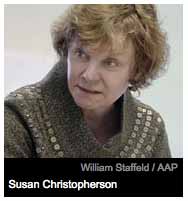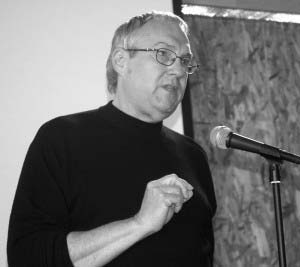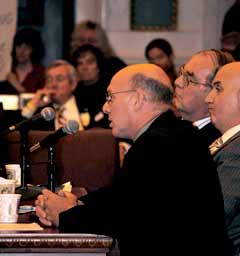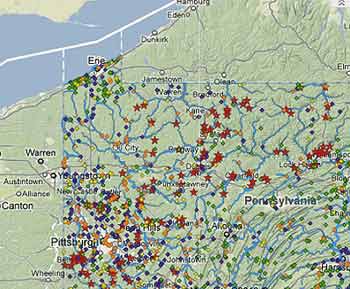Experts
Bruce Baizel. Testimony presented to the Committee on Environmental Protection, James F. Gennaro, Chair, Council of the City of New York, September 10, 2008. Earthworks Publications. Durango, CO.
"My testimony will first address the three main risks to water posed by gas development: well drilling and production, hydraulic fracturing and transportation of fluids to and from the wellsite. I will then briefly describe some specific incidents that illustrate these risks in a number of different states. Then, I will briefly discuss the current New York regulations most applicable to the risks associated with gas development. Finally, I will present some of the approaches that other municipalities and states have developed to try to address these risks."
Bruce Baizel is Senior Staff Attorney for the The Oil and Gas Accountability Project, a program of Earthworks, P.O. Box 1102, Durango, Colorado 81302.
See: Lustgarten (2009) "Buried Secrets: Gas Drilling’s Environmental Threat - ProPublica"
The Center for Healthy Environments and Communities (CHEC) exists to help individuals & communities identify the most important environmental problems facing them - empowering & energizing them with tools to prioritize & develop their own action plans towards more sustainable solutions for a healthy environment. Read more»
Check out FracTracker.org! The blog part provides a forum to discuss the impacts you have seen or felt regarding natural gas drilling in this region, as well as share data through the site's online data tool.
The data tool is an online information commons where you can access & upload all sorts of geographically-linked data. We will be hosting regional training sessions this summer on how to use FracTracker. Contact us with questions or to find out when & where the trainings will occur.
According to a review by Josh Kusnetz of ProPublica, FracTracker "allows people to search by topic or select a specific area on a map. It also shows who uploaded the specific data set and whether other people have downloaded it or found it helpful.
Since anyone can upload a data set, this transparency is critical to determining whether the information is reliable. CHEC will remove irrelevant data, but it doesn’t vet everything for accuracy. CHEC is counting on users to police the data themselves and to distinguish the good from the bad."
Susan Christopherson, J. Thomas Clark Professor of City and Regional Planning, has received a $100,000 grant from the Ithaca-based Park Foundation to study the economic effects of the proposed drilling in the Marcellus Shale, a rock formation that extends from New York south into Pennsylvania, Ohio, and West Virginia.
Christopherson has proposed conducting a $300,000 study that will examine issues such as the effects of the increase in gas drilling on schools, public health, and transportation systems.
The research project will be supported by several funders. “The question is, ‘What is going to be the cumulative effect of this kind of activity?’” says Christopherson, who specializes in economic development. “People are looking at this question from an environmental perspective, but no one is looking at it from an economic perspective.”
Christopherson worries about a “boom town” effect created by the surge of companies that want to extract natural gas from the Marcellus Shale. “We have had these periodically in the U.S. like the Gold Rush, where you get lots of people coming into an area in order to extract natural resources and then leaving,” she says.
Her hope is that the gas drilling could create a long-term investment in the economy of the Southern Tier. “I think they could do that,” she says, “but it has to be done very carefully. There has to be careful planning for the economy and to protect the environment. What people rarely recognize is that good environmental planning will also produce better economic outcomes.”
Climate change issues bring into greater prominence that all the world's people are linked together and that we all have a stake in creating a sustainable path for the planet and no such path can allow for 10 million avoidable child deaths each year.
--Kirk Smith, UC Berkeley, School of Public Health
Whatever your goal (economic growth, stable population democratic institutions, global equity, art, literature, science, an educated electorate, etc.), it is impaired by excess child mortality.
Malnutrition is the single most important risk factor for child mortality. According to Kirk Smith, "each of [its'] separate causes is thought to be increased by both climate change itself and, potentially, by efforts to combat climate change through biofuel expansion [and] energy price rises."
Professor Smith’s research addresses the relationships among environmental quality, health, resource use, development, and policy in developing countries, and the implications for policy of the potential to achieve co-benefits (health and climate) from pollution control in developing countries.
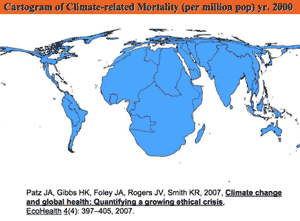
"One of the few positive sides of the climate change crisis is that the global village is no longer just an intellectual construct.
That we have one planet, one atmosphere, one set of mutual responsibilities, and one fate – these are now clear."
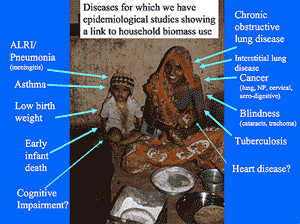
Thank you Professor Smith. I ask, what is the value of a human life? Climate change is going to kill millions of children, does it matter that they're not yours?
The value of a life in the United States is a factor in the quality of regulation and enforcement of the Clean Air Act, the Clean Water Act, and climate change policy initiatives that may not survive the Climate Zombies of the U.S. Congress.
As Washington and our insurance companies estimate an individual life's value at around 4 to 6 million dollars, the warrant for increased regulation of toxic industry seems more justified. Yet, the oil and gas industry and their government advocates still question the legal authority of the EPA and U.S. congress to enact and enforce environmental regulations as they relate to both climate change and the enormous consumption of water associated with hydraulic fracturing.
There are sociological and economic impacts of an unregulated energy industry. A tightly connected global ecosystem depends more and more on both a food and water supply that has become more privatized, making it difficult for self-sustaining indigenous farming to succeed.
One week's worth of food by various cultures:
Hundreds of millions of children are slated to die already, mostly by starvation, because of our present inaction.
The oil and gas industry has shown no evidence that it is ready or capable of self-regulation. It becomes an increasing threat to the health of humanity. (Neil Zusman. 2011-02-24)
"The exploitation of fossil fuels is integral to modern living and has been a key element of the rapid technological, social, and cultural changes of the past 250 years. Although such changes have brought undeniable benefits, this exploitation has contributed to a burden of illness through pollution of local and regional environments, and is the dominant cause of climate change.
This pattern of development is therefore unsustainable at a global level. At the same time, about 2·4 billion of the world’s population, disadvantaged by lack of access to clean energy, are exposed to high levels of indoor air pollutants from the inefficient burning of biomass fuels." (Wilkinson, 2007).
Smith, K. R, and E. Haigler. “Co-benefits of climate mitigation and health protection in energy systems: scoping methods.” Public Health 29 (2008): n. pag. Print.
Smith K.R., "Mitigating, Adapting, and Suffering: How Much of Each?", (Symposium on Climate and Health, KR Smith, ed), Annual Review of Public Health 29 (2008): 23. Print.
Wilkinson, Paul. et al. “A global perspective on energy: health effects and injustices.” The Lancet 370.9591 (2007): 965-978. Web.
See: Appelbaum, Binyamin. “A Life’s Value May Depend on the Agency, but It’s Rising.” The New York Times 16 Feb. 2011. Web. 17 Feb. 2011.
See also: Associated Press. "How to value life? EPA devalues its estimate: $900,000 taken off in what critics say is way to weaken pollution rules." 2008-07-10.
Alexa Jay. December 2, 2010. Climate Science Watch. "Final hearing of the House global warming committee: 'a fight that is far from over'".
“There is growing evidence from the real world that climate changes are accelerating faster than we originally feared and that impacts—already appearing—will be more widespread and severe than expected. This makes the arguments against taking actions against climate change not just wrong, but dangerous,” Dr. Gleick said in his written testimony.
See: Tara Lohan. Feb. 19, 2009. Alternet. "Peter Gleick: How We Can Avoid a World Without Water". Interview with Peter Gleick.
Rick Piltz. Nov. 1, 2009. "On 'Editing Scientists' at the White House Council on Environmental Quality".
Scientific American contrasts CEQ chair Nancy Sutley’s stated position on science and policy at the White House with what we observed, reported, and documented under her Bush-Cheney CEQ predecesors, and what the House Oversight and Government Reform Committee discovered in its lengthy investigation initiated after we leveled our charge. “My role here and CEQ’s role is to advise the president on environmental policy,” says Sutley. “The science is what the science is…I am not editing science.”
When Nancy Sutley moved in to her new office as chair of the Council on Environmental Quality (CEQ)—a 40-year-old White House environmental policy advisory office created by Congress—she found a lot of red pens. Immediately, she removed the pens from her desk and asked her staff to remove any red pens from their desks, as well.
“The White House should not be in the business of editing science,” Sutley says. “Let the scientists do the science. It’s a really easy bright line for me.”
Rick Piltz is the Founder and Director of Climate Science Watch
Rick has worked as an educator, writer, and policy analyst and advocate since the 1970’s, in federal and state government, academia, and nonprofit organizations. During his more than 20 years in Washington, his primary focus has been on the collision of climate science with the reality of climate politics and policy.
From 1995-2005 he held senior positions in the Coordination Office of the U.S. Global Change Research Program. In the spring of 2005, Rick resigned from his position to protest the Bush Administration’s political interference with climate change communication. His whistleblower documentation of politically motivated White House editing and censorship of climate science program reports intended for the public and Congress received front-page coverage in the New York Times and was widely reported in the media. Rick testified before both the House of Representatives and the Senate at hearings on political interference with federal climate scientists.
See: Whistleblower.org
See: Public Supports Consumer and Environmental Protections, Polls Show
Coalbed methane has rapidly become an important source of natural gas, particularly in the Inter-mountain West. The rapidity of its development has resulted in significant pressure on communities to deal with its environmental consequences.
Coalbed methane production often results in large quantities of water that are released as byproducts of production; in some cases, the water may inundate sensitive arid ecosystems, worsen surface water quality, and diminish undergroundwater supplies.
Noise, dust, and increased traffic; impairment of visibility and conflicts with recreation and other land use; impacts on wildlife and ecosystems; and other consequences of development have generated opposition in many communities.
Particularly vexing has been development on split estates, where surface owners do not own the mineral rights underneath their property and are required to cooperate with development that may disrupt the use and control of their land. This article examines the problems associated with coalbed methane development and offers a variety of suggestions for how conflicts could be reduced and how development could proceed in ways that are ecologically sustainable.
See: Hydraulic Fracturing Background Information | EPA (2004)
The Energy Policy Act passed by Congress in 2005 amended the Safe Drinking Water Act (SDWA) to exclude hydraulic fracturing fluids (except diesel fuel) related to energy production from regulation under the UIC program. States may choose to regulate hydraulic fracturing, however.
See: U.S. Environmental Protection Agency (EPA): Weston Wilson Whistle Blower Letter
See: Drilling Around the Law: Drinking Water Threatened by Toxic Natural Gas and Oil Drilling Chemicals
See: Hydraulic Fracturing of Oil and Gas Wells
See: Black Warrior Riverkeeper | Coalbed Methane
There are over four thousand coalbed methane wells in the Black Warrior River watershed. Tens of thousands of acres are leased to this practice, creating a massive network of roads and well pads. The extraction of coalbed methane involves a process known as hydraulic fracturing.
The Black River Watershed in Alabama provides water to over a million people.
See: Orion Magazine. November/December 2006. Taking On Goliath: Across the West, gas development is devastating land and people. | Now citizens are fighting back.
See: Report: Marcellus Shale Drillers Amass 1435 Violations in 2.5 Years
The Pennsylvania Land Trust Association has reviewed environmental violations accrued by Marcellus Shale drillers working in Pennsylvania between January 2008 and June 25, 2010. The records were obtained via a Right to Know Request made to the PA Department of Environmental Protection (DEP).
The Pennsylvania Land Trust Association seeks to protect Pennsylvania’s special places and landscapes for today and for generations to come.
To increase the quality and pace of land conservation, PALTA helps conservation practitioners improve their effectiveness, builds public understanding, and advocates for better governmental policy.
See also: Drilling in the Marcellus Shale | Academy of Natural Sciences
In April, 2010, the Academy's Center for Environmental Policy presented a public panel discussion, “The Marcellus Shale – The Science and the Policy.” Video of this program is available on our website.
Dr. David Velinsky testifying before the City
Council of Philadelphia on the environmental
impacts of drilling in the Marcellus Shale.
On September 28, 2010, Dr. David Velinsky, vice president of the Academy's Patrick Center for Environmental Research, testified before the City Council of Philadelphia about the scientific questions at hand and need for new research. A copy of his testimony is available for download.
"It is estimated that more than 5 million gallons of water per day are used in fracturing operations." ( p. 26 of 34. )
This 2006 Powerpoint may represent the only scholarly study found to date that indicates an accurate estimate of the amount of water used per day in hydrofracking. Further research into this estimated amount is required.
Presented at “The Future of Desalination in Texas,” Global Petroleum Research Institute, Texas A&M University, College Station, Texas, Aug. 6-8, 2006.
Created Sep 15, 2010 by Kyle Ferrar
This map shows the multitude of surface water withdrawals in Pennsylvania that are permitted by the PA DEP. The many points exemplify the magnitude that the PA community and economy relies on the quality of our surface water resources. The red stars show the oil and natural gas industry withdrawal locations.
Click to see more details on this map.
The current water management practices of the natural gas industry during the regional dry season are likely to have contributed to higher TDS concentration in the Monongahela River...
...the water withdrawals in the Monongahela River watershed are potentially causing a cumulative impact on flow volume in the river that magnifies all forms of pollution by increasing the pollutant concentrations. Much more research needs to be conducted on this issue, to ensure safe and sustainable permitting practices for water withdrawals.
See: Urbina, Ian. “Regulation Is Lax for Water From Gas Wells.” The New York Times 26 Feb. 2011. Web. 27 Feb. 2011.
See: With Natural Gas Drilling Boom, Pennsylvania Faces an Onslaught of Wastewater
See: WATER: Gas drilling in huge Appalachia reserve yields foul, briny byproduct - AP










